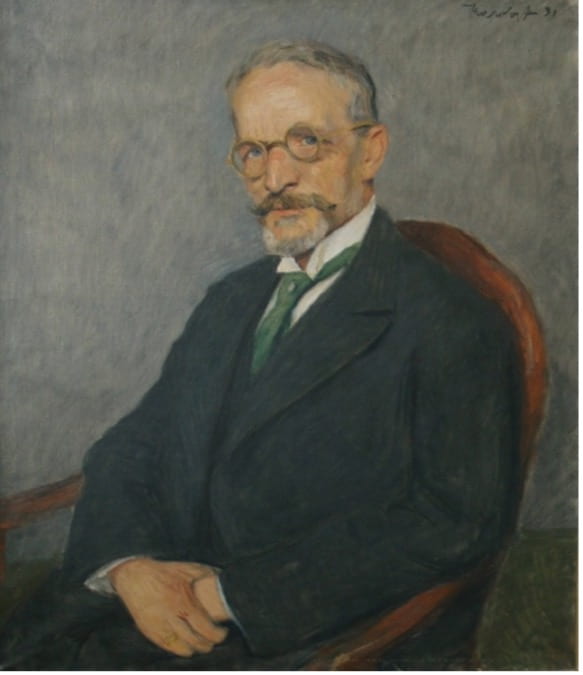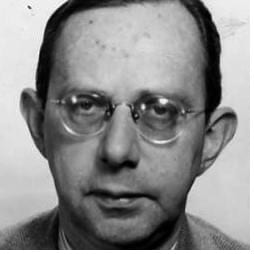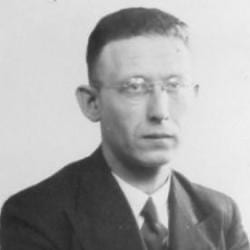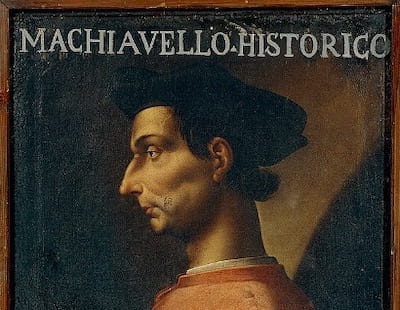By Andrew Gibson
In the dark days of the First World War, the great German historian Friedrich Meinecke (1862-1954) sketched out a research plan for his next book that would trace “the changes in the nature and spirit of power politics since the days of the Renaissance” (245). His magisterial Die Idee der Staatsräson in der neueren Geschichte was the eventual result. Originally published in 1924 and translated into English in 1957 under the title Machiavellism: The Idea of the Reason of State in Modern History, Meinecke’s intellectual history of the “reason of state” (raison d’état, ragion di stato, Staatsräson)explored ideas of national interest and their place in modern political history. It was a book written to reconcile political and intellectual crises: to make peace with the dark aspects of Realpolitik while not completely abandoning Meinecke’s earlier faith in the progressive possibilities of nationalism described in Weltbürgertum und Nationalstaat (1908). Now seeing the state as an “amphibious creature, which simultaneously inhabited the ethical and natural worlds,” Meinecke wondered whether modern states could unite moral ambitions with their natural striving for power, or whether they were simply fated to pursue ruthless power politics (16).
To contemplate these concerns, the intellectual historian returned to the writings of the infamous Florentine secretary, Niccolò Machiavelli (1469-1527). Meinecke opened his 1924 work with a chapter on Machiavelli—the “heathen” to whom “the fear of hell was unknown”—because he saw the Florentine as “the first to discover the real nature of raison d’état” (29). By separating ethical concerns from his political analysis, Machiavelli transformed the development of ‘modern’ (post-sixteenth century) political thought; he revealed how ethical demands were often incompatible with political necessity and demonstrated how immoral acts could secure political order. Political thought from now on “contained the poison of an inner contradiction” between “absolute and relative standards of value,” Meinecke wrote (39). Universal ethical commandments inherited by Western Christendom conflicted with situational ethics. This dualism grew out of the incipient historical thinking present in Machiavelli’s Prince and Discourses on Livy. For Meinecke, the origins of a modern historical worldview coincided with the birth of reason of state thought. Machiavelli proved to be the originator of this tradition because he developed universal political laws and applied them to his own historical moment: the collapse of the Florentine republic with the return of the Medici in 1512. Machiavelli saw politics as an autonomous sphere of human life and insisted—according to the principle of necessità—that leaders of states could disregard their ethical commitments “whenever the needs of national self-preservation would require it” (39-40). It was for this reason that Machiavelli’s theory was “a sword which was plunged into the flank of Western humanity” (49). He set the terms to which later political theories had to respond and offered dark lessons on the art of rule.
Appreciating the dangerous teachings Machiavelli disclosed, Meinecke warned against the treacherous inclination of idealizing power politics and the state—without condemning the state to be inherently evil, as did Jacob Burckhardt in his Weltgeschichtliche Betrachtungen (1905). Ultimately, Meinecke attempted to revive Staatsräson as a moderating political ideal while affirming that “raison d’état, power politics, Machiavellism and war could never be banished from the world” (429). To him, the “reason of state” was “the fundamental principle of national conduct” instructing the statesman what he must do to grow the state, thereby preserving its health and strength. At each moment in time, there existed “one ideal course of action, one ideal raison d’état” that could guide state conduct through combining a commitment to morality and cultural development with a drive for power (1). Ethics and power were not always incompatible; in fact, when united they produced the highest expression of the state and defined the duty of the “statesman.” Bound to serve the state and protect its people, a political leader was responsible for determining the then-existing reason of state and aligning state policy according to its dictates. This meant, at times, a leader could disregard moral laws in the service of “national necessity” [Staatsnotwendigkeit] (2).

Friedrich Meinecke Gesellschaft.
It was the state’s creative combination between ethics (Ethos) and power (Kratos) that fascinated Meinecke. In the middle area between these forces—“between behavior prompted by the power-impulse and behavior prompted by moral responsibility”—Meinecke saw a “bridge” that was the “reason of state.” Occupied with “consideration of what is expedient, useful and beneficial,” Staatsräson, as a principle of state conduct,negotiated between drives for power and ethical commitments (5). While Meinecke saw adherence to the principles of the reason of state restricting “the hypertrophy of power” across Europe in previous centuries, he worried the seemingly “limitlessness” of “power” would doom twentieth-century geopolitics (418). Even war, “that last and strongest instrument of raison d’état” became “a daemonic force which scorned the rein of raison d’état and threw its rider in the abyss” (422). The very “idea of raison d’état,” Meinecke suggested, was“the middle of a severe crisis” and ran the risk of “becoming a merely utilitarian instrument without ethical application, in danger of sinking back again from wisdom to mere cunning” (423, 17).
Immersed in the contentious debates over his country’s new constitutional order following the Treaty of Versailles, Meinecke’s writings on the reason of state—both popular and scholarly—expressed qualified support for the Weimar Republic. With a new appreciation for the tragic dimensions of politics and historical development, Meinecke wrote in November 1918 that he “remain[ed], turned towards the past, a monarchist of heart [Herzensmonarchist], and turned toward the future, a republican by reason [Vernunftrepublikaner]” (281). Similar to other equivocal republicans, Meinecke proclaimed the need for a strong executive responsible to the German people—what he termed a “dictator of trust” [Vertrauensdiktatur] (307). Sucha leader would protect the German nation in a hostile international climate and strengthen the state by drawing people to it; his support for the republic was not based on republican principles but on whether the new order could rationally organize power and “beat the sword of class struggle into the sickle of a people’s community [Volksgemeinschaft]” (339). Cautiously optimistic, Meinecke ended his reason of state book with a call to the “modern statesman” who would follow the example of Friedrich the Great (1712-1786) and Otto von Bismarck (1815-1898) by “exert[ing] his dual sense of responsibility towards the state and the moral law” (429). Yet in subsequent years, Meinecke witnessed the rise of “Hitlerism” and National Socialism, which he later associated with “mass Machiavellism” in The German Catastrophe (1946).
Meinecke’s post-First World War reflections on the “reason of state,” the “crisis of historicism,” and eventually “Hitlerism” inspired important mid-twentieth-century historiographical debates over Niccolò Machiavelli and his political-philosophical legacy. These debates took on transatlantic dimensions as several of his Jewish doctoral students emigrated to the United States in the 1930s. Forced to flee Germany as the Nazis solidified power, Felix Gilbert (1905-1991) and Hans Baron (1900-1988) contributed to what H. Stuart Hughes described as the “sea change” in American social and political thought. As former Meinecke students and practitioners of the history of ideas [Ideengeschichte], Gilbert and Baron promoted “realist” and “civic humanist” readings of Machiavelli, altering the place of the Florentine Renaissance in the American historical imagination. Assisted by patronage from American “New Historians,” Gilbert and Baron helped create a “tradition of Renaissance studies” in the United States where “before them there had existed but the scattered and miscellaneous work of isolated scholars” (213). In fact, Renaissance studies soon became one of the largest growing historical subfields within American universities following the Second World War (1098-99). The imaginative ways in which Gilbert, Baron, and other émigré scholars described the relevance of Renaissance thought to the mid-twentieth-century contributed to the subfield’s success. Their readings of Machiavelli and the Renaissance tradition also revived “reason of state” thinking in the United States during the Cold War.

By “Americanizing” Meineckean Ideengeschichte through their English-language writings, Gilbert and Baron popularized studies of the history of ideas and demonstrated the method’s political utility. While assistant to the American historian Edward Mead Earle (1894-1954), Gilbert conducted research on the history of European strategic thought in effort to help policy makers determine American national interests as authoritarian powers grew in Europe. With his military studies group assembled at Princeton’s Institute for Advanced Study, Earle, an American foreign policy thinker, counseled the Roosevelt administration to join the European war. Against isolationists, Earle believed the United States needed to shape the future international order, which is why some scholars identify his seminars with a globalized conception of American “national security.” The “aim” of Earle’s Princeton seminars, Gilbert later recalled, was to “demonstrate that, above and beyond ideology, the notion of national security ought to serve as the guiding criterion determining the course of foreign policy” (175). This required fresh analysis of the twentieth-century’s competitive frontiers—and, consequently, determinations on how to mobilize material power and popular support to ensure American democracy would triumph over the global “torrent” of totalitarianism. Ultimately, the seminars detailed how Americans needed to be more comfortable exercising force in world affairs to build a future peace.
After the attack on Pearl Harbor and the United States’ formal entry into the Second World War, Gilbert worked to democratize reason of state thinking through his contribution to Makers of Modern Strategy: Military Thought from Machiavelli to Hitter (1943). In the opening essay, “Machiavelli and the Renaissance of the Art of War,” Gilbert argued Machiavelli’s military populism, developed in the sixteenth century, could still instruct republics on how to turn citizens into soldiers—the central theme of Machiavelli’s Art of War. Gilbert’s 1943 essay in Makers of Modern Strategy foreshadowed Machiavelli’s ascendant position in mid-twentieth-century studies of international relations, leading one scholar to recently call Gilbert “the first modern realist.” Interested to show that Machiavelli was not simply a teacher of evil, Gilbert portrayed the Florentine as a modern political-military strategist who could offer American readers insights on the exercise of state power in an era of power politics. According to him, “investigation of the role of military power in political life was the magnet to which all of Machiavelli’s political thought was inevitably drawn” (3). It was why the Florentine insisted “political institutions in their spirit as well as their form, must be shaped in accordance with military needs” (22). Decades later, in his now-canonical study Machiavelli and Guicciardini: Politics and History in Sixteenth-Century Florence (1965), Gilbert re-emphasized Machiavelli’s modernity, noting how the Florentine’s “vision of politics” continued to capitative because he “revealed—more than anyone before or after him—that, at any time, politics is choice and decision” (200).
Following the Second World War and his service in the Research and Analysis division of the Office of Strategic Services (OSS), the precursor to the CIA, Gilbert reminded Americans of their own reason of state tradition. In To the Farewell Address (1961), he identified early American foreign policy with “the school of the interests of the state.” Out of historical research first developed in Earle’s Princeton seminars, Gilbert found George Washington’s “Farewell Address”—largely written by Alexander Hamilton—to be a “political testament” typical of the eighteenth century (133). As a political realist, Hamilton “understood that sovereign states, competition among them, and power politics were necessary factors in social life; successful political action depended on proceeding according to these presuppositions” (134). Through his historical writing, Gilbert insisted the teachings of power politics could be found in the early political history of the United States; the implication was that these traditions needed to be recovered as the United States emerged as a hegemonic power in the mid-twentieth-century.

Less explicitly political, Hans Baron’s post-emigration scholarship attempted to trace the intellectual origins of early modern “civic humanism” [Bürgerhumanismus]. Like Meinecke, Baron appreciated the dualism at the heart of early modern political thinking, yet he saw the twin commitments of humanism and scholasticism as more important in determining its character than Meinecke’s ethics and power. Once in the United States, Baron increasingly stressed how the military threat posed by the Visconti “tyranny” in Milan prompted Italian scholars and statesmen to identify the republic of Florence as the chief defender of political liberty across the Italian peninsula. In The Crisis of the Early Italian Renaissance (1955), he argued Coluccio Salutati (1331-1406) and Leonardo Bruni (1370-1444), facing the political “crisis” of their day, devised new views of history—“views which prepared the way for the historical philosophy that … culminated with Machiavelli’s Discorsi” (83). Attempting to show how Machiavelli’s thinking was indebted to an earlier discourse, Baron’s historiographical writings reflected his desire to alter “the picture of Machiavelli as painted, until recently, with the colors of the modern national idea.” By sketching the “background” of Machiavelli’s intellectual world and the political conditions of his native Florence, Baron hoped readers would come to see Machiavelli, “the Florentine citizen.” This was a man who “throughout his life believed—and indeed proved his faith by deeds—in civic freedom as the life-blood of healthy nations” (137). Like other Florentines before him, Machiavelli’s thought “sprouted forth from that cross-fertilization between historical and political interests,” Baron wrote (143). While he contended greater historiographical research was needed to uncover the deeper roots of modern political thought, Baron’s historicized Machiavelli emerged as partisan of a beleaguered republic—making him an ally to the American republic increasingly defining itself against the “authoritarian” Soviet Union.
By building on Meinecke’s notion of Staatsräson and deploying the history of ideas for political-cum-scholarly ends in the United States, both Baron and Gilbert probed the works of Niccolò Machiavelli for insights on mid-twentieth-century politics. The ability of these émigré scholars to make the Florentine speak to twentieth-century geopolitics is why American intellectuals interested in national defense are returning to Machiavelli’s writings during the current “return of great power rivalry.” With Machiavelli, Baron and Gilbert found a historical figure whose legacy could serve as the site of political and historical reflection. Writing for the American Historical Association in 1942, Baron noted how the Italian Renaissance proved a “sensitive instrument for many schools of historical thought in the past” as it was the period “used more frequently than others for testing what was thought to be a pattern of the modern world.” Given the “stirring new experiences” in world politics, he and Gilbert believed “something could be learned from the crude simile of the mirror” that was Renaissance history (123). Reflecting the character of their times while avoiding servility to it, Baron and Gilbert’s writings on Machiavelli and Renaissance politics demonstrated their enthusiasm for historical studies to speak to the present. Their works remain relevant as democratic republics continue to face “crises” across the globe.
Andrew Gibson is a Ph.D. candidate in Government at Georgetown University, where he studies political theory and international relations. He is currently writing his dissertation on mid-twentieth-century readings of Machiavelli and transatlantic debates over the Florentine secretary’s political-historical legacy.
Featured Image: Portrait of Niccolò Machiavelli by Antonio Maria Crespi Castoldi (1858-1630). Courtesy of Wikimedia Commons.



